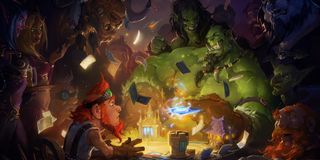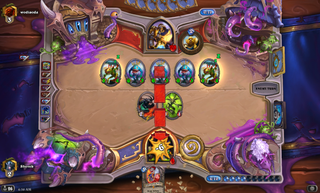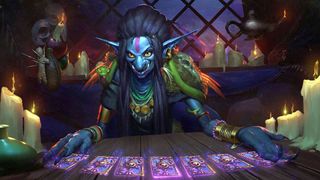How Hearthstone helped one player beat his gambling addiction
From $26,000 in gambling debt to not a cent paid in Hearthstone. It's an inspiring recovery.

It's interesting that Hearthstone has helped replace blackjack for you. In your estimation, how different is Hearthstone from blackjack?
This is a rather fun question. You could ask this question to several people and each one of them would probably give you a different answer. Hearthstone and blackjack are both card games that operate off the slogan "easy to learn, hard to master." You can teach a random person off the street the basics of either game in a matter of minutes. But having just the basics down alone doesn't get you very far in either game.
This is where I begin to draw parallels and similarities between Hearthstone and blackjack. Blackjack is one of the few games in the casino in which the player's actions (or skill, if you will) directly influence how much he/she wins compared to others of different "skill levels" in the long run.
A prime example of this: say you were dealt a hard 12. The dealer has a "5" card face-up. An inexperienced player would almost always hit the 12. However this is actually an incorrect play. 12 is deceptively "small" but can still bust you if a single 10 shows up. Statistically you will win more hands by standing on the 12 and hoping the dealer will bust.
I enjoyed blackjack the most out of every game in the casino because it felt like my decisions actually mattered. I felt like I was winning the bets instead of some phantom pulling the RNG-strings and dropping my winnings off for me like in roulette or craps.

Hearthstone is rich in these types of situations in which the player's level of experience can alter the decisions made during the play. I've encountered Reddit posts in which the OP presents a screenshot of the hand and board state and challenges the community to find the lethal/optimal play. The response is usually very diverse as everybody argues that their play is better by gaining "X" without losing "Y" or playing around "Z."
But there's the other side of the similarity as well—the inevitability of losing. In blackjack, there are just some hands that are impossible to win no matter what you do. If I hit, I bust. If I stay, I lose to the dealer's 20. If I surrender (this rule is not offered at most tables), I lose half my bet anyway. There is no situation that I come out ahead.
PC Gamer Newsletter
Sign up to get the best content of the week, and great gaming deals, as picked by the editors.
In Hearthstone, there are situations like this as well. Your opponent had this ridiculous opening that flooded the board and you didn't draw any removal or AOE. Disregarding fringe scenarios in which your opponent decides to BM stupidly or disconnect from internet problems, you will lose this game next turn no matter what you decide to play.
Do your parents know you play Hearthstone? Are they aware how it’s helped you in your rehabilitation?
For the record, my parents absolutely do know that I play Hearthstone. It's practically the only thing I do when I get home from work! I got pissed at my mom one time for coming into my room and clicking off my computer while I'm in the middle of an Arena match. She just stared at me and said "It's dinner time.”
At one point my dad came into my room just to see what the heck I was doing. He's a total plebian when it comes to computer games and most things with electrical circuits. Normally he leaves me alone after he glances at my screen to see that I'm not online gambling or anything (or watching porn, but I doubt he'd stick around anyway if that was the case). But this time, he just kinda hovered around and watched as I played Hearthstone. He actually pulled up a chair and asked "so what's so great about this game?" At that point, we probably had our first "father/son moment" in many years. I showed him the ropes of Hearthstone and just elaborated all the rules to him. I played several matches while he watched, and explained all of my moves as I made them. I still remember when I clicked on Stormwind Champion to attack and my dad chuckled after hearing the comical "For the Alliance!"
At this point, it had already been several months casino-free and I had been very diligent with my debt-payments. My parents were already quite happy with me. But they were still in the dark as to how I managed to flip my addiction around cold-turkey. I myself at that time didn't quite make the connection either. Well I knew something had changed within me but I didn't fully understand what; I was happily just taking it for granted that I was satisfied just playing Hearthstone.
Would you recommend other gambling addicts to seek out competitive card games to see if it can help?
This is a tricky question, I'm afraid. The last thing I want to do is give false advice to other recovering gambling addicts. There is also a certain hazard to new beginners playing Hearthstone in which I'll elaborate on later. I'm afraid that there is no "one-size-fits-all" solution to nursing a gambling problem. Saturating my time with Hearthstone has done wonders for me, but it's extremely hard to say if it will have the same effect on other addicts.
But one piece of advice that I'm confident on giving is to stay as busy as possible. Occupy your mind. Set meaningful goals for yourself everyday that are achievable. One goal that is always and should always be on the list is to stay away from the casino. Eliminate as much downtime as you can. Fortunately I have a job that keeps me busy throughout the day with various tasks. Usually the tasks keep piling up faster than I can eliminate them, so I don't exactly have much downtime at work.

The real downtime happens when you get off work. Most people would be ecstatic to have a clear evening to do whatever they please. But for a recovering addict such as myself, it's a chunk of time that I need to deal with and fill with "stuff to do" that isn't gambling in a casino. Hearthstone is that "stuff to do" for me. But if you have any thing else you enjoy doing (hobbies, sports, Netflix, whatever), set a goal to do whatever it is instead of gambling.
I actually don't recommend fake-chips online gambling. This method was recommended to me by several people I knew and by random people during the brief time when I used therapy websites. I tried it briefly, but it didn't work. It just felt boring and even winning chips I didn't feel like I was progressing with anything. You can set your fake bankroll to whatever value you want with these simulations. Winning is pointless. Losing is pointless. The game was pointless. But with Hearthstone, you can progress by slowly building up your gold/dust/card collection. I've heard of players who've spent thousands of dollars on card packs for their collection. Then I'm thinking "Wow, I haven't spent a dime on this game and I probably have a collection worth thousands of dollars!"
Now, there is a certain hazard that I would like to elaborate on when playing Hearthstone, especially to new beginners. This especially applies to people using Hearthstone as a way to divert their gambling urges. Do not give into the temptation of buying card packs with real money. This was my toughest battle when I started playing. There will be a point when you run out of free quests that award you gold, you have no gold for any packs or arena, your (mostly) basic deck is getting stomped by players with better cards, you don't have enough dust to craft the cards you want, and your collection is too pitiful to create the deck you want. That’s when the temptation to buy card packs is at its worst. But you have to stay strong and be patient. This is very critical to anybody using this game as a recovery tool. You may very well lose yourself to your addiction if you start buying card packs with real money. I may very well be in a completely different situation right now if I had given in to this temptation.
Interview has been lightly edited for length and clarity.

Luke Winkie is a freelance journalist and contributor to many publications, including PC Gamer, The New York Times, Gawker, Slate, and Mel Magazine. In between bouts of writing about Hearthstone, World of Warcraft and Twitch culture here on PC Gamer, Luke also publishes the newsletter On Posting. As a self-described "chronic poster," Luke has "spent hours deep-scrolling through surreptitious Likes tabs to uncover the root of intra-publication beef and broken down quote-tweet animosity like it’s Super Bowl tape." When he graduated from journalism school, he had no idea how bad it was going to get.
Most Popular

